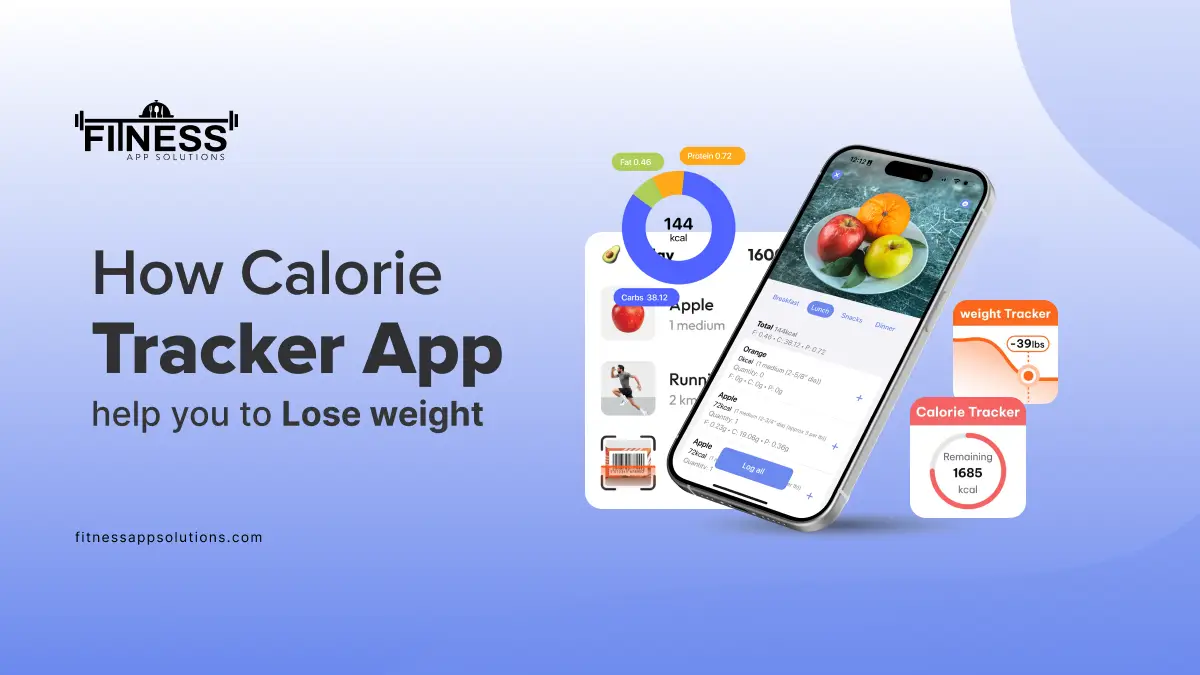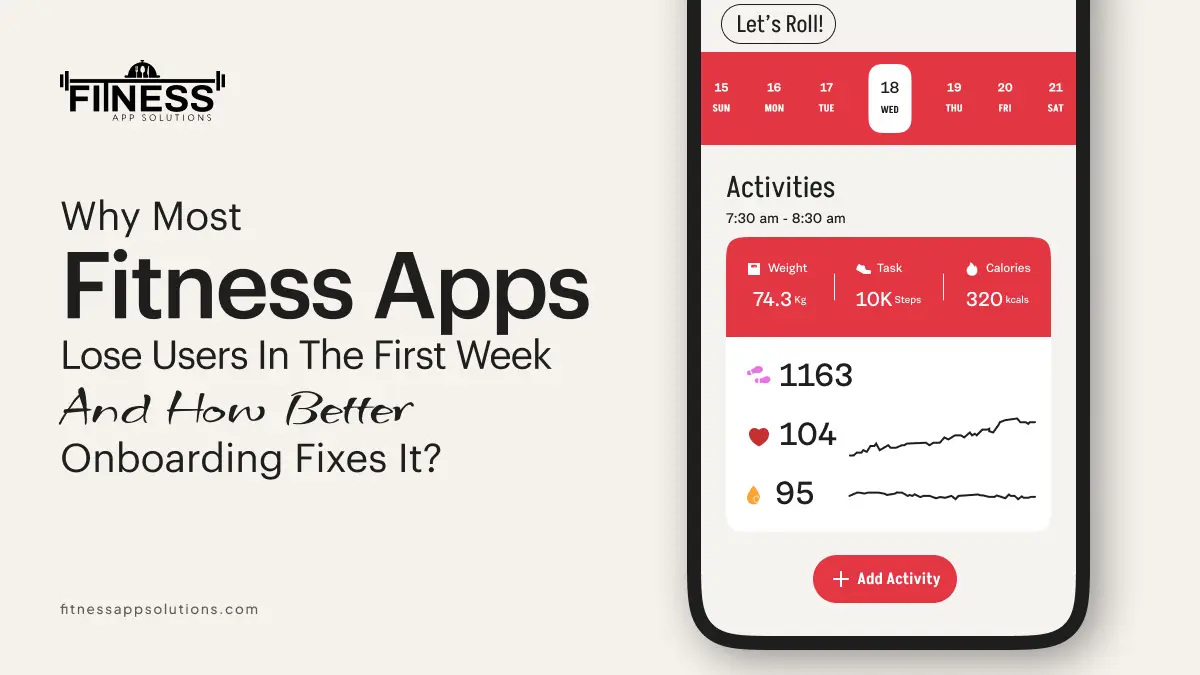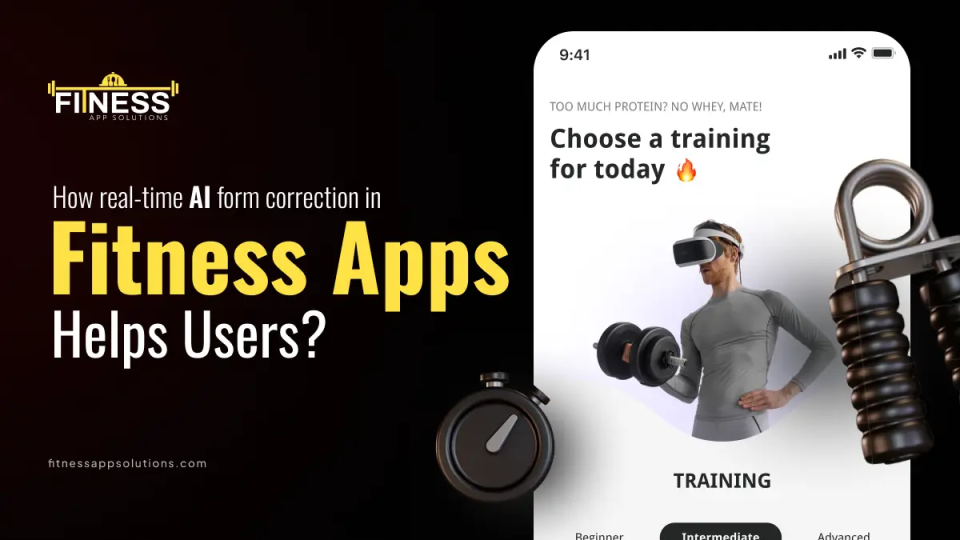Calorie tracking has become a vital component of managing nutrition goals and fitness. Whether focusing on losing weight, gaining muscle, or simply staying toned, a calorie tracker app can offer the structure required to keep fit. But what makes these apps more impactful, and how can you create one that stands out? In this article, we will cover how calorie tracker apps can help you to lose weight.
Understanding Calorie Tracking
Calorie tracking records, the number of calories you consume through beverages and food and the number of calories you burn through your daily activities and routine. At its core, it’s managing your energy intake versus your energy expenditure—the fundamental principle behind impactful loss maintenance or healthy weight gain.
- The key to weight management depends on the caloric balance:
- Calorie surplus (Consuming more than your burn) leads to weight gain.
- Calorie deficit (burning more than you consume) leads to weight loss.
- Calorie maintenance (consuming equal to what you burn) maintains current weight.
Most people are unsure of how many calories are in the food they eat or how many calorie they require daily. That’s where tracking comes in: it bridges the gap between reality and perception.
Benefits of Using a Calorie Tracker App
![]()
Increased Awareness & Accountability
One of the most significant challenges people face in managing their weight is a lack of awareness about what they are eating. Most of us underestimate portion sizes, forget to log small snacks, or aren’t fully aware of the hidden calories in dressings, sauces, or drinks.
A calorie tracker app brings all this to attention. Users can gain a more precise picture of their eating patterns by consistently logging meals and snacks. This awareness helps them identify;
- High-calorie food may be sabotaging their efforts.
- Poor eating habits like late-night snacking or emotional eating.
- Gaps in their nutritional intake.
Therefore, the simple act of recording meals also adds a layer of accountability. Users often think twice about their choices When they know they must log that cookie or soda. Over time, this develops mindfulness, leading to better decision-making and healthier habits.
The simple act of recording meals also adds a layer of accountability. Users often think twice about their choices When they know they’ll have to log that cookie or soda. Over time, this builds mindfulness, leading to better decision-making and healthier habits.
Personalized Daily Calorie Goals
The exact size for all often fails as everyone’s body and lifestyle differ. A calorie tracker app addresses this by providing customized daily calorie goals depending on age, gender, height and weight, activity level, and desired goal (weight loss, gain, or maintenance). Also, these goals are calculated mainly by utilizing validated formulas.
Let’s understand with an example: Sarah, a 30-year-old worker with 5’6″, 150 lb, light activity who aims to lose 1lb/week, will see a recommendation of ~1,500 kcal/day; meanwhile, Joe, a 25-year-old fitness instructor (6’180 lb, very active) aiming to maintain weight, gets–2,800 kcal/day.
As they use the app, both can adjust their targets. Sarah’s target may drop to 1450 kcal once she hits 140lb.
Nutrient Breakdown
Weight loss is not about cutting calories but eating the exact calories. That’s where nutrient tracking comes in. Most of the high-quality calorie-tracking apps offer a detailed breakdown of the following:
- Macronutrients: Carbohydrates, Proteins, and fats.
- Micronutrients: Vitamins and minerals (in some advanced apps).
Moreover, understanding the ratio of macronutrients helps users optimize energy levels, preserve muscle mass during weight loss, and support post-workout recovery. Therefore, someone focusing on muscle gain may increase their protein intake, while someone managing diabetes may monitor carbohydrate levels. Seeing these values in real-time empowers users to fine-tune their diet for aesthetics and overall health.
Meal Planning Made Easy
Planning meals can be one of the most overwhelming parts of a health journey. Calorie tracker apps simplify this with features like extensive food databases with the value of nutrition, barcode scanners to immediately log packages of food, personalized meals and recipes that can be saved for future use, and meal suggestions depending on dietary goals and preferences.
This makes meal prep more effective and removes the guesswork from selecting what to eat. Users can log an entire day’s meal in advance, making it more seamless to stay within calorie limits.
Progress Tracking and Motivation
Tracking your progress can be a robust motivator. Calorie tracker apps provide features like weight progress charts, calorie and macro trends over time, and daily, weekly, and monthly summaries. They also offer streak tracking to reward consistent logging.
These features give users a sense of achievement, even for small wins like meeting a weekly goal or logging food every day. Many apps also include badges or gamified rewards to keep motivation high.
Some platforms offer social or community features, enabling users to connect with others on similar journeys. This sense of community can be incredibly inspiring through challenges, shared meals, or discussion forums.
How to Develop a Calorie Tracker App?
![]()
Core Feature to Include
Focus on the most important features to users to make your calorie tracker app effective and user-friendly. The first step is enabling users to create personalized profiles. During signup, the app should gather key information like weight, height, gender, activity level, and personal goals like weight loss, gain, or maintenance.
Depending on this data, the app should automatically calculate the user’s daily calorie needs using established nutritional formulas. Food logging should be central to the app’s functionality. Users must be able to easily search a comprehensive food database or scan barcodes to input packaged items.
Many apps enhance this with options for saving custom meals, logging frequent recipes, or even using voice input. In more advanced apps, image recognition may allow users to snap a picture of their plate.
Tech Stack Suggestions
Selecting the appropriate technology is vital to ensure your app performs seamlessly and can scale with user demand. For mobile app development, react native is the best choice due to its cross-platform capability, enabling you to build for both Android and iOS with a single codebase. If performance is a top priority or if you are creating platform-specific features, then native development with Swift (for iOS) or Kotlin (For Android) is a robust alternative.
On the backend, Node.js is a popular option for real-time performance and managing high-volume requests, while Django (python) provides a clean and secure framework with strong community support. Firebase can be a great backend choice for real-time database authentication, syncing, and push notifications.
UI/UX Tips
Designing the user interface and experience is as important as the app’s technical foundation. A clean, intuitive interface can significantly boost user engagement. Users should be able to log meals or track progress in just a few taps.
That means designing a dashboard that displays calorie intake, remaining calories, and macronutrient breakdown in a visually appealing way. Using color-coded charts, icons, or progress bars can help users grasp their stats at a glance.
To reduce friction, perform repetitive actions quickly, such as saving a commonly eaten meal or scanning a barcode. Consider the entire journey from waking up to bedtime and how the app can seamlessly fit into a user’s daily routine. Smart notifications, daily check-in prompts, and personalized visual elements like congratulatory animations when goals are hit can make the app feel more like a coach than a chore.
Privacy & Compliance
Since your app will handle sensitive personal data, including health stats, weight history, and possibly even medical information, privacy must be a top priority.
Depending on your target audience, you may need to comply with regulations such as the General Data Protection Regulation (GDPR) for European users or the California Consumer Privacy Act (CCPA) in the United States.
If your app includes features that interact with healthcare providers or deliver medical-grade advice, you might also fall under HIPAA regulations.
Monetization Ideas
Once your app is built and running smoothly, the next step is to consider how it will generate revenue. The most common model is freemium, where basic features like food logging and weight tracking are free. At the same time, a paid subscription offers advanced tools such as detailed macro analysis, AI-powered meal plans, or custom workout integrations.
In-app purchases are another way to monetize. You could offer downloadable meal plans, premium coaching, or personalized diet strategies for a one-time fee. Some apps generate revenue through affiliate partnerships, such as recommending fitness gear or healthy snacks and earning commissions when users purchase.
Summing Up
A calorie tracker app is more than just a digital food diary. It’s a powerful tool for transforming your lifestyle. Real-time insights into what you eat and how much energy you expend empower you to make informed, mindful decisions daily. With features like personalized calorie targets, nutrient breakdowns, and progress tracking, these apps simplify complex nutritional data into actionable steps. They also reduce decision fatigue by offering meal suggestions, reminders, and visual progress charts that keep you motivated and consistent.
Frequently Asked Questions
1.Does tracking calories help lose weight?
Yes, tracking calories is one of the most effective ways to lose weight. It helps you stay aware of what and how much you’re eating, making it easier to maintain a calorie deficit, the core requirement for weight loss.
2.Is lose weight app effective?
Weight loss can be effective when utilized consistently. They combine calorie tracking, goal setting, progress monitoring, and even fitness when used consistently. They combine calorie tracking, goal setting, progress monitoring, and even fitness tracking to create a structured and motivating weight loss journey.
3.Do calorie track apps help?
Absolutely, Calorie tracking apps help you become more mindful on your eating habits, understand portion sizes, and make better food choices. They also allow you to track your activity and ensure you are on the right path towards your health goals.
4.What is the best calorie tracking app?
The best calorie track is one that aligns with your lifestyle and makes it easier to stay consistent ideally. It should offer a comprehensive food database, simple logging options like barcode scanning, and the ability to customize your daily calorie and nutrient goals.
5.How does a calorie tracker app help with weight loss?
A calorie tracker app supports weight loss by helping us to stay aware of your daily food intake and making sure that it streamlines with your current goals. By consistently logging your meals and snacks, you can better manage portion sizes and maintain a calorie deficit, which is vital for losing weight. Many apps enable you to micronutrients like fats, protein, and carbohydrates, offering you deeper insight into the quality of your diet.



